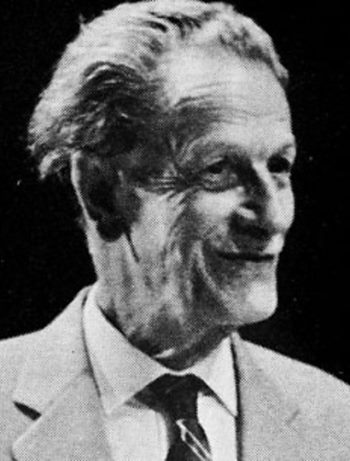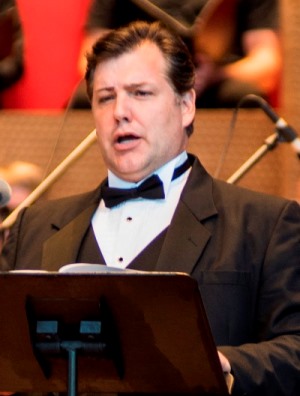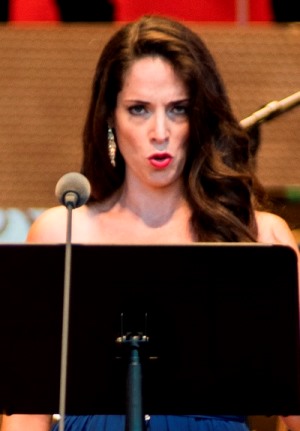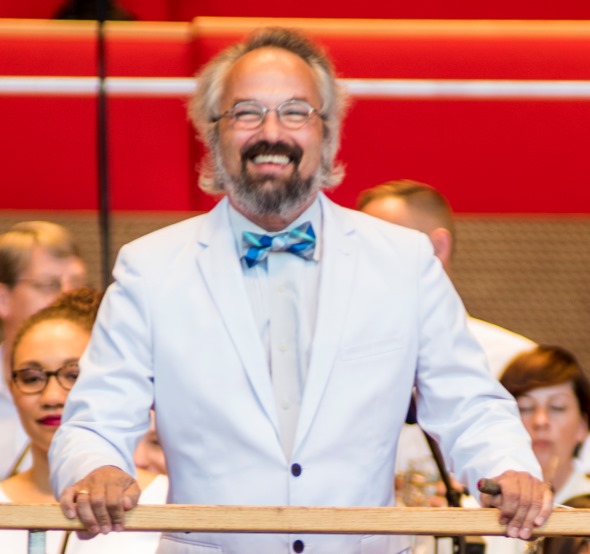Under Kalmar’s command, Grand Park forces triumph in oratorio hailing end of World War II
Review: Grand Park Festival Orchestra and Chorus, conducted by Carlos Kalmar, at Millennium Park.
By Lawrence B. Johnson
We’re well into another Grant Park Music Festival season that has demonstrated once again the value of conductor Carlos Kalmar’s artistic leadership through 18 summers. Where else but in Millennium Park, under Kalmar’s baton, might one hope to hear the likes of Swiss composer Frank Martin’s grand-scaled, inexplicably neglected oratorio “In terra pax,” a profound and moving reflection on the long-awaited end of the carnage that was World War II.
 Trusting in an Allied victory even as the war raged across Europe, Radio Geneva commissioned Martin (1890-1974) to create a large choral work to celebrate the restoration of peace. The sublime result, a multifaceted religious parable some 45 minutes in length for orchestra, chorus and five solo voices, was “In terra pax” – which in the end received its world premiere in Geneva three days before Germany’s ultimate surrender.
Trusting in an Allied victory even as the war raged across Europe, Radio Geneva commissioned Martin (1890-1974) to create a large choral work to celebrate the restoration of peace. The sublime result, a multifaceted religious parable some 45 minutes in length for orchestra, chorus and five solo voices, was “In terra pax” – which in the end received its world premiere in Geneva three days before Germany’s ultimate surrender.
Despite the work’s Latin title, the sung text is in French, culled from both the Old and New Testaments, passages reworked into four episodes evoking the Apocalypse, then peace, followed by an appeal for forgiveness and finally an expression of faith in “the Lord God Almighty, who was and is and is to come.”
Like other great religious works for the concert hall – one thinks immediately of Mozart’s C minor Mass, Beethoven’s Missa Solemnis, the Verdi Requiem – Martin’s “In terra pax” by no means requires specific religious conviction to engage heart and mind in its spiritual catharsis. This is music of imposing seriousness, thrilling luminosity, absorbing intricacy. And from a composer who sometimes edged into the harmonic severity of the Second Viennese School, it is openly tonal.
 It’s hard to know which to admire first or most about the Grant Park Festival’s fine production July 28 engineered – to be fair – jointly by Kalmar and Festival Chorus director Christopher Bell. In this densely textual work, the choir sings a great deal, and Bell’s choristers dispatched their big role with aplomb – epitomized in the desperate but also ethereal appeal that begins, “Mon Dieu, mon Dieu, pourquoi m’as-Tu abandonné?” (My God, my God, why hast thou forsaken me?).
It’s hard to know which to admire first or most about the Grant Park Festival’s fine production July 28 engineered – to be fair – jointly by Kalmar and Festival Chorus director Christopher Bell. In this densely textual work, the choir sings a great deal, and Bell’s choristers dispatched their big role with aplomb – epitomized in the desperate but also ethereal appeal that begins, “Mon Dieu, mon Dieu, pourquoi m’as-Tu abandonné?” (My God, my God, why hast thou forsaken me?).
Not the least virtue of the choir’s performance was its comprehensible French, a strength as well of the five soloists. What a superb group that was! To the formidable opening narrative of the Four Horsemen of the Apocalypse, baritone James Westman brought not only lyric power but also the inflection and awareness of a practiced story-teller.
Bass-baritone Daniel Okulitch ratcheted up the war drama with the hurled admonition, “Malheur au people chargé de péchés…Voici, le jour de l’Éternel arrive! Jour cruel, jour de colère” (O sinful nation, a people laden with iniquity…Behold, the day of the Lord cometh, cruel in wrath and anger). The quality of singing was upheld also in the voices of soprano Colleen Daly and tenor David Pomeroy.
 Yet the brightest of these stars was perhaps mezzo-soprano Lauren Segal, whose magnificent singing in the contralto register lent supreme weight and import to every word and line of her bounteous assignment. To her lustrous and compelling voice fell the long tract foreshadowing Jesus’ suffering in parallel to the misery of the conflict just ending: “Voici mon serviteur, mon élu…méprisé, abandonné des hommes… semblable à un agneau qu’on mène à la boucherie” (Behold my servant, my elect…despised, rejected of men…he is brought as a lamb to the slaughter).
Yet the brightest of these stars was perhaps mezzo-soprano Lauren Segal, whose magnificent singing in the contralto register lent supreme weight and import to every word and line of her bounteous assignment. To her lustrous and compelling voice fell the long tract foreshadowing Jesus’ suffering in parallel to the misery of the conflict just ending: “Voici mon serviteur, mon élu…méprisé, abandonné des hommes… semblable à un agneau qu’on mène à la boucherie” (Behold my servant, my elect…despised, rejected of men…he is brought as a lamb to the slaughter).
No less credit is due the Grant Park Orchestra, which delivered Martin’s complex and subtly expressive score with genuine élan – the whole paced and shaped and indeed revealed by Kalmar as if he were leading a favorite piece from the standard repertoire. That’s what is so special about his programming and his efficiency in turning the new or the obscure into regular successes.
The program opened less happily, with a performance of Mozart’s Symphony No. 36 (“Linz”) that suffered from particularly rude intrusions by helicopter blades beating overhead. Yet, even given that, the symphony got off to a sluggish start, not just in its rather slow tempo but even more in the absence of animating spring in the string playing. By the finale, Kalmar had managed to create real buoyancy, but the overall impression was of familiar music lightly glossed in order to do justice to a major rarity.
Related Link:
- Spanish guitar program is next up at the Grant Park Music Festival. Details here
Tags: Carlos Kalmar, Christopher Bell, Colleen Daly, Daniel Okulitch, David Pomeroy, Frank Martin, Grant Park Music Festival, James Westman, Lauren Segal


